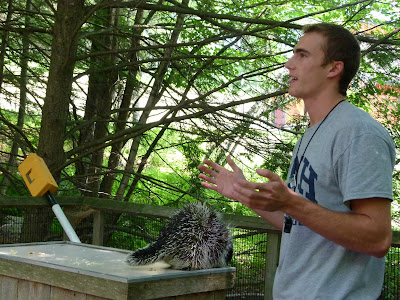By Jimmy Black, Program Intern
As an aspiring vet, I look at everything I do at Squam Lakes Natural Science Center as a way to help me in my veterinary development. Outreach programs are another great aspect of this internship that better prepare me for a career working with people and animals.
In outreach we do programs ranging from fifteen minutes away, giving talks to kids that can’t pay attention to anything other than how funny it is that the owl flapped its wings, to programs more than two hours away, with older kids who propose questions that would stump any naturalist. I love it when I come across someone who can stump me with a question about the animal I am presenting. It helps me further research the animal resulting in making a much better presentation the next time around. This relates to veterinary work because doctors are constantly coming across a disease or problem they have never seen before and may not know how to approach it. These types of questions promote further research resulting in a significantly more educated doctor in the long run.
Another part of outreach I love is the people skills I am learning. As a Resident Assistant at the University of New Hampshire, I have grown in my ability to talk with college students with a wide variety of personalities. Although there are times college students can act like kids, teaching and conversing with children is much different. Outreach has helped me think more about how I communicate information to people from different backgrounds. Again, relating it back to veterinary work, as a veterinarian I will become accustomed to an immense vocabulary of terms and medicines, but the general public will probably not know what these words mean. Veterinary work is only partially about helping animals, while a huge portion of the work is relaying the information to pet owners in a way that allows them to help their pets when you are not around.
Finally, the other aspect of outreach that I have gained the most from is the animal handling part of the job. During presentations, it is key for me to understand how an animal tends to act and how to display it in the best way for an audience to enjoy. There are times that the program animals get spooked or act out of character. It is my job to anticipate these occurrences and know how to deal with the situation without panicking. The naturalists and animal care employees here at the Science Center spend a lot of time working with the interns helping us to become comfortable around the different program animals. Obviously as a vet you need to be confidant and relaxed around animals because in a medical setting an animal is much more likely to be frightened and behave abnormally. Acquiring this experience working with a wide variety of animals is helping me grow significantly and putting me more on track to making my dream career a reality!


No comments:
Post a Comment